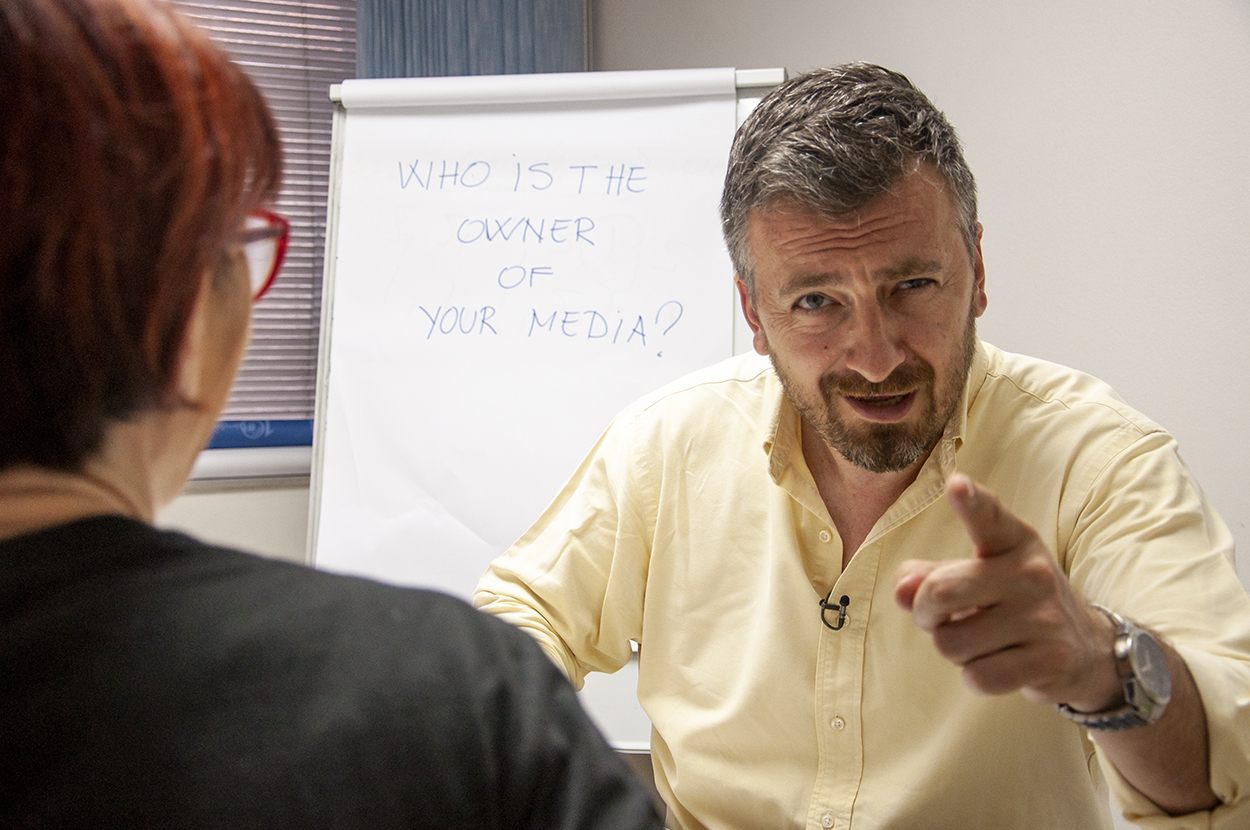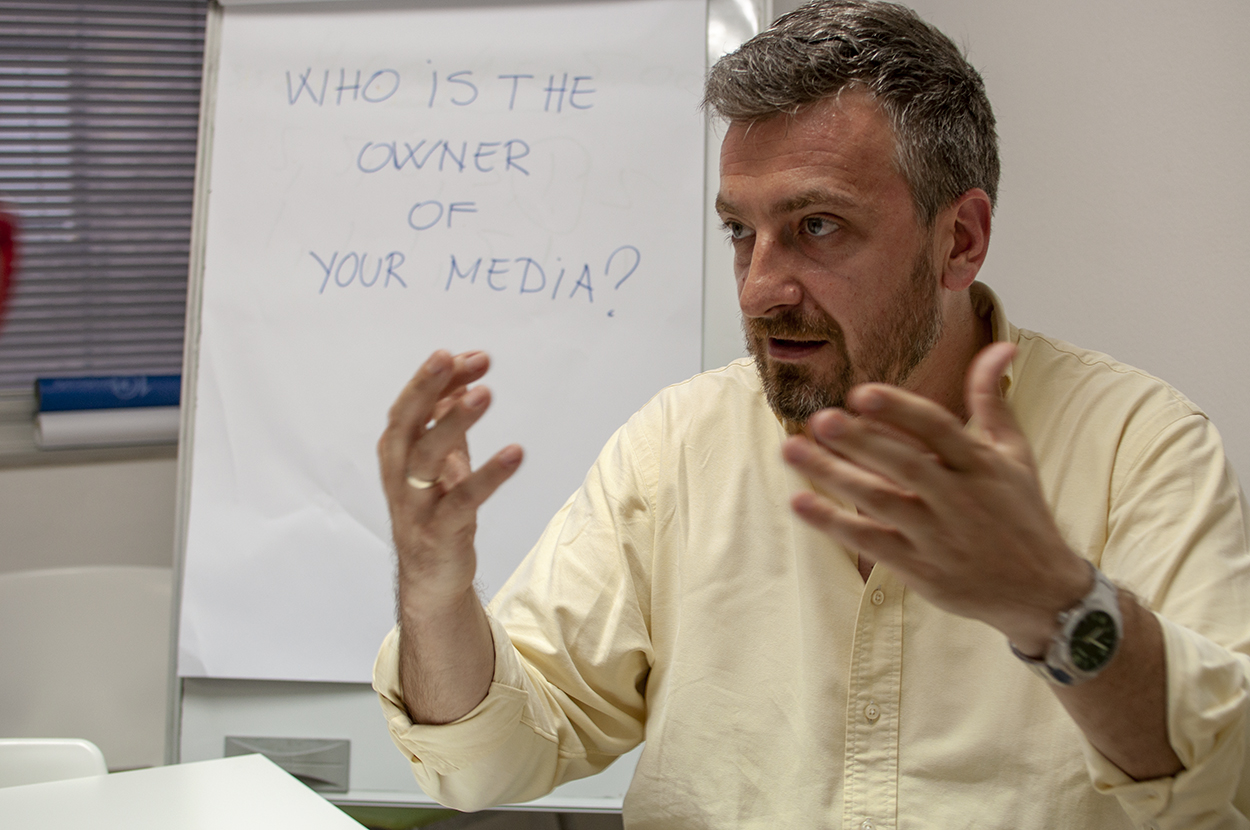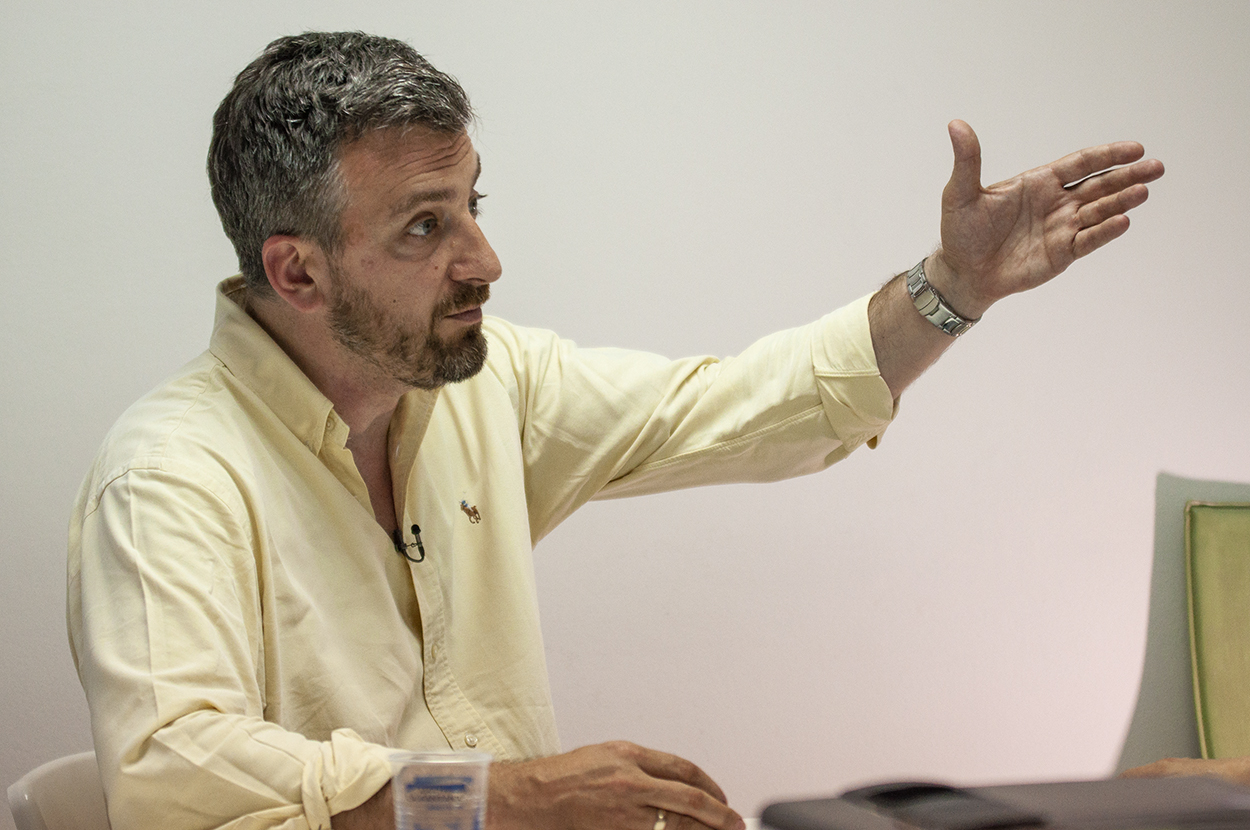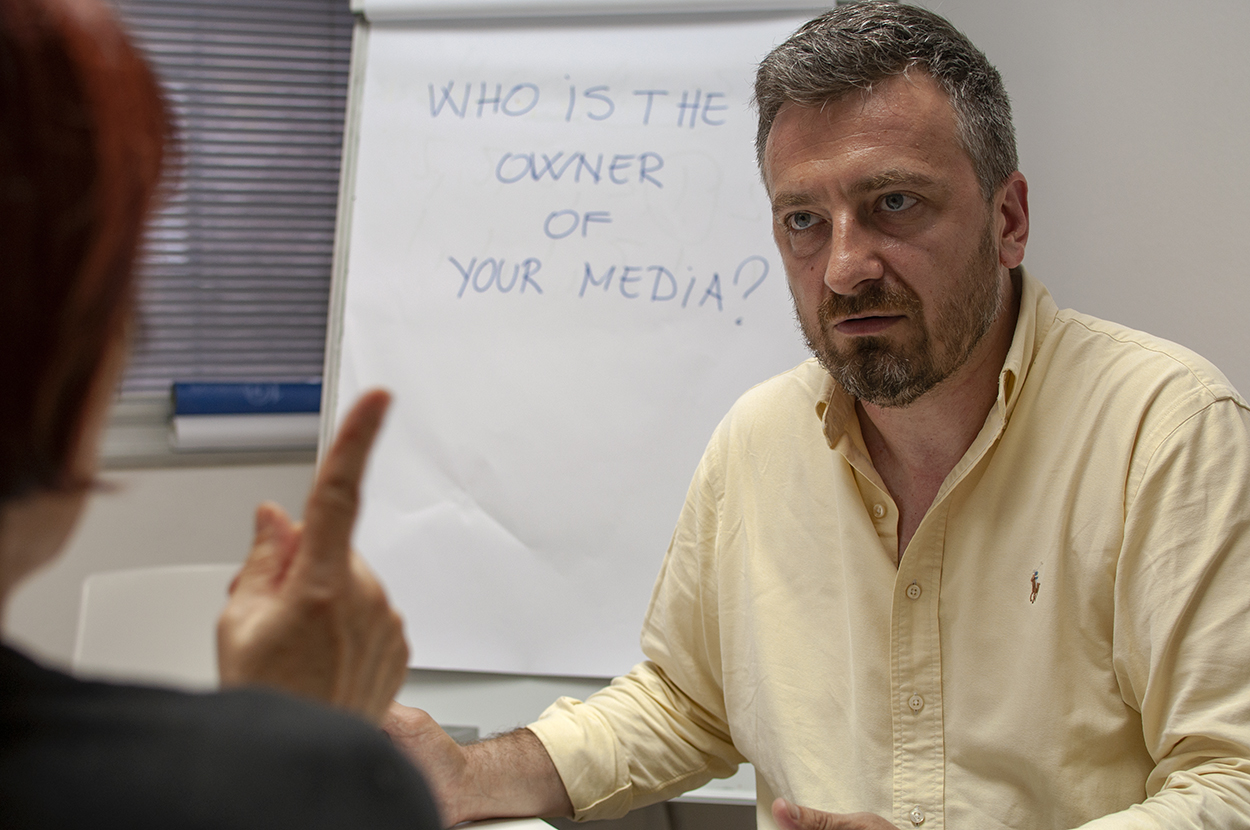The media flunked because they joined the political coalition
“In Serbia, journalistic courage is derogated and reduced to asking questions. The threat to journalists in Serbia comes from the political leadership, because if the Prime Minister had said you are a foreign mercenary, that you are not a journalist, that you are lying, then the next step might be – to have us all arrested or killed. Journalists all around the world are losing the battle because the journalism ‘has fallen off’ this beautiful ideal, which had existed for 100 years, being recognised as the fourth branch of government, which was taken for granted. We now find ourselves fighting for the place in society again.”
“When Draza Petrovic presented the award to me, he said – if I had wanted to be brave, I would have become a firefighter, not a journalist.”, answered Slobodan Georgiev, BIRN editor, winner of the award “Stanislav Stasa Marinkovic” for journalistic courage, when asked what journalistic courage is. He recalled that Superman, in fact, was a journalist, but he observed that Superman was, to be honest, “a really clumsy journalist, but after he gets into the payphone booth, takes off his civilian clothes, and throws away his notebook, he becomes the Superman and solves problems”. In his Istinomer podcast interview, Georgiev says that “limits of the power of journalist” are in front of “the prosecution doors”, because it is an institution “that in a regulated system pushes the things further”.

To what extent was the journalistic courage here reduced to the courage to ask questions?
It is derogated and debilitated, and it turns out if you ask you are brave. Yet, on the other hand, this is what journalists do – they ask. Why did we become journalists? Well, because we like to ask, and that is restricted for us in some way. Although this is something every authoritarian government does, they limit the room for questions. To ask is the core of our work, and if today being brave means asking questions, that this is it.
During the ceremony of the award “Stanislav Stasa Marinkovic“, you said there are those who persist in journalism, while the rest of the journalists have given up or got scared. Is their right to give up and become afraid equal to your right to be brave?
I think so, but it depends where they are and who they are working for. I always say I am not full of understanding for people working in public broadcasting service.
Have they got scared and given up?
They first got scared, and in time, they somehow gave up on who they should be. I am mentioning them particularly since their workspace is clearly regulated and they can do their job. I do not know why they are not doing it, because if they were doing their job and should they be professionally “harmed” due to their job, in a sense they are fired, I think they would have much bigger protection than any journalist in Serbia working in some small media outlet such as BIRN.
One day, should it be forgiven and forgotten to the journalists who had surrendered or had become afraid?
My version is radical. For RTS, I think the same Tsipras had done in Greece should be done, the cancellation of the national television, and then moving on from scratch. This is not some kind of “warning” they simply do not do their job. They excuse themselves by saying they have good TV series programme, that they do not broadcast “reality” programmes and that on RTS Third Channel you can listen to classical music and this is all nice but has nothing to do with informing citizens. In my opinion, the key thing is the news programme, which is a disaster and it makes the people in Serbia clueless about what is going on in the country.
A total number of attacks on journalists, according to information from NUNS website, from 2008 to 2019 is more than 750, and it was lower in 2012 and 2013, and then increased since 2014. The most drastic is the case of setting the journalist’s house on fire, the attempt of murder. Are the attacks on journalists exactly proportionate or disproportionate to professionalism?
I believe that journalists here must possess a kind of resistivity. As the kids would say, you cannot really have “a knee-jerk reaction” to everything. What I want to say is that we are far from royals here, so everyone would be watching their manners and tone. This is really a wild society. A journalist has to be aware of that and has to have higher resistivity than the other people. For example, you have to be ready to hear the stories that other people might not be able to stand. We should sieve through the pressures and see what is there. The threat here, visible through some examples, is the verbal violence that unfortunately comes from the top. We had that situation here in BIRN. If the then-prime minister made a public announcement saying – you are a foreign mercenary, you are not a journalist, you are lying, you have made this up, I really do not know what is the next step – to have us all arrested or killed. That is the most dangerous here, but the fact some people were calling, talking, leaving messages would not make me worried much.
You have said that we live in a wild society and you recommend we should be less sensitive to specific things, and on the other hand, we always hear the message that seems like a bureaucratic platitude – that journalists should only do their job. How do you do “your job”, for example, after a video featuring you as “the main hero”? How do you do your job after physical violence during Vucic inauguration, and after Martinovic showed these journalists pictures in the Assembly how are they supposed to do their job, how was Milan Jovanovic to do his job after his house was burned?
First of all, these are some extreme examples. Of course, if someone assaults you, threatens to kill you, if I might say it that way, you would expect that there is a state which could deal with that, which is something we cannot either predict or neglect. However, everything mentioned before, in my deepest conviction, happened because people who are the heads of the state have enabled that. They have said that this is all right, but if someone delegitimizes you, what are we talking about then? We are now referring to journalists, and you say you are a journalist, but the man running the country says – not really, no, those are not journalists…
And what is your professional argument or a response to that “you are not a journalist”?
I am fighting in BIRN by publishing the facts which cannot be disputed, even when they try. They have not disputed anything we wrote years back. This refers to the present and the previous government. Everything we published was correct, unfortunately for some people, who had been arrested after we published our stories when the government had changed later.

But is it not any better because of that for you and other journalists in Serbia?
My colleagues and I do what we believe in. We support that by evidence, documentation, statements, photos, etc., and then we report. And when they say do your job – this is really it. At the same time, journalists should be careful, they should examine things, they should not rush, and that will help them appear different to anything else, and that would be their response and argument in defence because then they cannot compare you to some fictional organisations.
The problem is they can. Not only compare you to this but qualify you as well.
We cannot defend ourselves against that, in the atmosphere where someone is occupying the entire media space, and we are to be found at its margins. You are now asking me, is it possible to do the job at all?
No, I am not asking you that. What I want to ask is whether the journalists in Serbia, in the context of the social status of the profession, are fighting a losing battle?
I would be relativizing now. I think they are fighting a losing battle everywhere because the journalism has fallen off this beautiful system, a nice ideal, which had existed for 100 years being recognised as the fourth branch of government. It got carried away a bit in that “heights” when it comes to this. Journalism was believed to be very important, and people somehow took that for granted, as if it had appeared out of nowhere. We now find ourselves in the situation to fight for our place in society again and to prove to the people, first of all, the readers and the viewers that we matter.
Who should prove their importance to the readers, viewers, listeners and digital platform users, should it be you from BIRN or those from Pink, whose range is more significant?
I think my range is absolutely more significant, because I talk about things that exist, and they speak about non-existing things, and I am sure that I know much more than them, and I am convinced they would step away themselves from that position if they could, that they would not work like that, both you and I know that. The system is like that – who would be sitting where and doing what is a matter of competences.
You have said that journalism has to start fighting for its place in society. Is that battle professional or political?
It is, first of all, a professional battle. It is necessary that people who have a job also know the job description, its purpose, and how it should be done. I am not sure that all the people in Serbia understand that, especially journalists, because when you ask them what the purpose of all of that is, they will quote the politicians, for example, Jefferson. Why don’t you come up with your own definition, try it yourself, and don’t take from others, someone else determining you. You should be the one to do that. There was this football coach, who, when he was asked what football is, had said – football is football. So someone who is working in journalism should say what journalism is. I support and believe in this. I think that is a duty.
What do you believe in?
The journalists need to know that they should be the first to redefine their place, together with their editorial teams, and once they know that, they would be able to push a bit stronger, and then they would be able to say “hey, we matter too, and we will demonstrate how important we are”.
You are demonstrating your importance to whom – politicians in government, society, whom?
The entire system. It is not only politicians.
But the problem here is that you do not matter.
No, let’s take it slowly. It is not only politicians. Society is more complex than that. It is not easy for people in politics as well, as they dread, they are not confident and do not know also, they especially do not know what to do. So I think at the end of the day all of us journalists who are in some type of journalism, should really try more, meaning that we fight for our place in the world.
But this was my original question bearing in mind that journalism is in recession, though the recession in the USA is different to the one in Serbia, whether fighting for the position of the profession in the society is political?
When you have to deal with politicians, you are in the zone of politics, but your weapons are not political. Your weapons are your stories, and the value of those stories and how much people can derive what they need from them will actually determine your worth. If we look at where we are now, we are actually hovering at the media margin, along with other colleagues, who are at the same margin, but what we have managed to do in the last six years is not small I think.
What was the success?
Two things. I think we have preserved some type of essence there is some breeze, some journalism like it was “B92” in the 90s. Downtown here, we were able to get the signal it, and the people outside were installing some bigger antennas just to be able to hear it.

Radio B92, not exclusively, at one moment “decided” that Milosevic is such a grand evil that the only thing which will work is the political battle.
We can talk long about it as I have an explanation for that too. What happened with the media that survived the 90s until now, with that halo of the independent media around them?
Well, they flunked.
Do you know why they flunked? They went down because they had essentially joined the political coalition because they believed that the evil was so enormous that you can make some kind of a deal with a political option without being abused, but the politician’s job is to abuse you. So, this is what they do, and those who complained about Djindjic, later on, had every right to do that, but he had done what was the most important for him – he gathered everyone he could to achieve success. So, dear comrades, you were thinking that you will get medals for that, including everything else, but I am sorry, that did not happen.
This is not our topic now, I do not agree with…
This is the topic because we have a similar moment now. The question is whether we have learned anything and should we join the political coalitions now. I think not. I have stretched myself to explain that to some colleagues at the local level that they should not do that no matter what, because at the end that will kill them, if not tomorrow than day after tomorrow.
But they have been killed already.
So, the only thing you can do is to see your media as some sort of community, and although that sounds really stupid now, that is really true. That is the whole point. Gather your people no matter how many, there are 2,000 to 5,000 readers, that is not a small number, isn’t it? That is not insignificant. Safeguard these people, work with them, they are your protection. No politician in the world can be your protection, because it is your job to control them, for the sake of the people who cannot do the same each day, who have been told they are controlling the politicians when they go out to vote – once in every four years. And we do that daily and therefore help you, so this is why we matter to you, why our position is essential. You go out to vote once in four years, I go out every day to inspect what they do and report on that.
To what extent has violence in the society along with violence towards journalist become an everyday thing and not merely an incident? We have the cases of beating the students on campus in Novi Sad that Vojvodina Anti-Fascist Alliance interpreted as crossing the Rubicon.
You and I would now be in Novi Sad, with 100,000 people in the streets had that point been passed. We would not be having this conversation, but we would be there.
This is precisely my question – after all these years, do we accept violence as a part of our daily lives?
That was not, if I may say it like this, a top story. That is true. If it had been a top story on RTS, and if they had asked questions, made video footage, if they had done their job, it would have been different. But, because in this situation only a small number of people learned about it then it was very easy to manipulate that. Is he really a student, maybe he is a drug addict, perhaps he is related to them and the other… To be honest, I have not seen that at best 50 friends have gathered somewhere.
They are signing the petition at the University, the professors have started it.
What is the point of the petition?! They should have been going there immediately.
That is the question. Whether the violence is normality, so you just brush it off and move on?
People have changed. When I was a 20-year-old student, it was not like that. When my friend was beaten here, in Terazije Square, on 2 February 1997, along with some other people, during the rally the day after the number of people in the streets doubled. No one waited for anything, no one signed the petition, and RTS did not report on it, but all of us knew.
Why is that so?
Well, because people have changed.

You say RTS had not reported, but we knew, and now RTS had not reported also, and no one knows, but we have social media now.
I have a different theory for that, and it is that the protests did not have a more significant effect, because, among other things, the universities did not join the protests. I think this is a critical point and I am sure that it would have been different if the universities were protesting. After the 2017 Presidential elections, they went to protests after school, as they went to classes, studied, and then in the afternoon, they went for a walk in the city. The other ones were worried a little, for two days, and then they realised it was nothing serious and let them walk because it would not mean anything. People have been walking for six months now, and the University did not stop for a single day, and they have so many problems, the University as it cannot decide whether something was plagiarised or not.
How do you explain that?
If not young people, then I really do not know who should be protesting and reacting to violence. For a couple of first Saturdays, I felt awful, because I am 42 and I am considered younger. That is ridiculous. It should not be 65-year-old people rebelling, they cannot make the protests. If the University is silent, if the so-called youth is mute then this is it. But it is obviously okay for those people, or they gave up. In the end, when you compare 1996 and 2018, it is really incomparable. We really had no bread on our plates. These people, especially in Belgrade, they have a good life – going out, partying, having scholarships.
I wouldn’t say this is how they live.
Okay, but the majority of them plans to leave for somewhere and so on.
That might be crucial, why would they fight for the country in which they won’t stay.
During these protests, we had seen what happened when a grammar school started rebelling, how the authorities reacted. Can you imagine the reaction of the authorities if the University of Belgrade would stop for a month? Everything would be different. But young people who are studying are obviously not interested in that. They are keen on other things, and they have a right to. What we oldsters consider a problem, they don’t, what we believe is no good they are not even facing.
You have mentioned the protests, and there would be some summing up after six months…
The All Soul’s Day is approaching on Saturday…
Do you agree with the estimates that the greatest success of these protests was the dispelling of fear, if I may go back to our topic of courage from the beginning?
We cannot immediately see some things. Had the fear been removed is something we will see when we would be witnessing the work of institutions. This is my benchmark. When I see people resisting at the local level, when they do something at the local level, when I hear someone at their job raised the voice saying – you are forcing me to do illegal things, or – you are a total amateur, please do not force me to do some things that will bring about the collapse of some government system, then I would be ready to believe that the fear has been dispelled.
Do you reckon that Judge Majic case is stimulating as an encouragement for people from institutions to speak their mind?
I believe so. You should show yourselves now, where are you, you should do something. If I may say, Vukasin Obradovic was on hunger strike, he wanted to die, to kill himself because they had tortured him there and he could not have continued with his papers. There was at least 300 of us saying – hey, this has to be stopped, this cannot be. So I would like to see 300 judges standing behind Majic saying – you cannot do this, we have the power in this country just like you do. In my opinion, this is it. Had the journalist done something? I think we had and others should do too. Check the doctors – they say their system is not good, so they are packing the bags and moving to Germany. They say Zlatibor Loncar is not a real doctor. So the real doctors should gather to raise their voices, what are they waiting for? Who would be the one to stop them, who would stop the professors? Who would replace them all? You can replace the director of EPS, but you cannot replace the entire University.
Maybe they can, there is the “co-optation”, as the Freedom House wrote…
For that, we have to wait and see. If we could see it, we would know that the protests had some effect.
